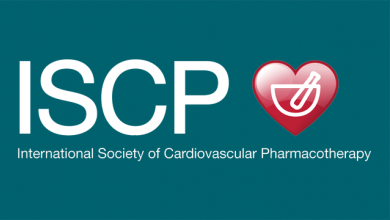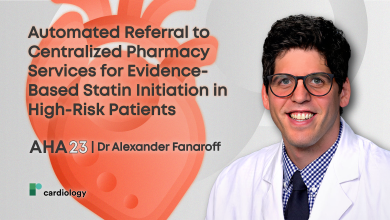Search results
Statins and Insulin Resistance
Author(s):
GM Sanvee
,
M Panajatovic
,
J Bouitbir
,
et al
Added:
3 years ago
Article
Author(s):
Kazeen Abdullah
,
Anand Rohatgi
Added:
3 years ago
Statins are currently the most efficacious and widely prescribed lipid-lowering medications.1 Numerous randomised controlled trials across a spectrum of baseline atherosclerotic cardiovascular disease (ASCVD) risk show that a 1.0 mmol/L (~40 mg/dL) reduction in low-density lipoprotein cholesterol (LDL-C) with statin therapy is associated with an overall 21 % reduction in major vascular events and…
View more
Author(s):
Laurent Fauchier
Added:
3 years ago
Hypothetically, 3-hydroxy-3-methylglutaryl co-enzyme A (HMG-CoA) reductase inhibitors (statins) protect against arrhythmias in addition to their well-established secondary prevention benefits against atherosclerotic coronary artery disease. The use of statins has been suggested to protect against atrial fibrillation (AF) in some clinical studies, but remains rather inadequately explored…
View more
Author(s):
Marielle Scherrer-Crosbie
Added:
1 year ago
ACC.23/WCC — In this succinct late-breaking science interview, Investigator, Dr Marielle Scherrer-Crosbie (Hospital of the University of Pennsylvania, US) discusses the results from the STOP-CA trial (Massachusetts General Hospital). This randomized phase II trial aims to investigate whether atorvastatin, a commonly prescribed statin drug for reducing cholesterol levels, can protect the heart…
View more
Author(s):
Nilofer Sorathia
,
Hussein Al-Rubaye
,
Benham Zal
Added:
3 years ago
Statins are most frequently prescribed for the primary prevention of cardiovascular disease due to their lipid-lowering properties. They are known to exert their effect by competitive inhibition of 3-hydroxy-3-methylglutaryl coenzyme A (HMG-CoA) reductase. The reduction in the synthesis of cholesterol induces upregulation of LDL receptors in the liver, resulting in increased clearance and…
View more
Statin Therapy in Patients with Diastolic Heart Failure - Time for a Large, Randomised Study?
Author(s):
Marek Roik
,
Malgorzata H Starczewska
,
Grzegorz Opolski
Added:
3 years ago
Article
Author(s):
Michel Farnier
,
John JP Kastelein
Added:
3 years ago
Clinical trial evidence from the past two decades has demonstrated that lowering cholesterol levels markedly impacts the occurrence of cardiovascular (CV) disease, including coronary heart disease, a leading cause of mortality and morbidity in the US and Europe.1–7 Data from these studies form the basis of national and international treatment guidelines delineating lipid thresholds and…
View more
Author(s):
Renata Cífková
Added:
3 years ago
Hypertension is the most prevalent cardiovascular disease affecting 20–50 % of the adult population.1 Elevated blood pressure has been identified as a risk factor for coronary heart disease (CHD), heart failure, stroke, peripheral arterial disease, renal failure and atrial fibrillation both in men and women in a large number of epidemiological studies.2–4 So far, the largest meta-analysis of…
View more
AHA 23: SUPER LIPID
Author(s):
Alexander Fanaroff
Added:
5 months ago
Video
Author(s):
Claudio Borghi
,
Arrigo FG Cicero
Added:
3 years ago
It is well known that hypertension is a strong independent risk factor for coronary and cerebrovascular diseases, as well as for heart failure, atrial fibrillation and chronic renal failure, in both industrialised and developing countries,1 thus substantially contributing to the global burden of disease. Moreover, it is well known that reducing blood pressure (BP) in hypertensive patients is…
View more














